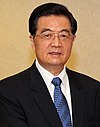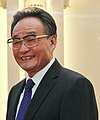2010 National People's Congress
| 2010 National People's Congress 第十一届全国人民代表大会第三次会议 Dì-shíyī Jiè Quánguó Rénmín Dàibiǎo Dàhuì Dì-sāncì Huìyì 3rd Plenary Session 12th National People's Congress 5 March – 14 March |
||||||||
|---|---|---|---|---|---|---|---|---|
|
|
||||||||
| President | Premier | Congress Chairman | ||||||
 |
 |
 |
||||||
| Hu Jintao | Wen Jiabao | Wu Bangguo | ||||||
| since 15 March 2003 |
since 16 March 2003 |
since 15 March 2003 |
||||||
|
|
||||||||
|
|
||||||||
|
|
||||||||
|
|
||||||||
|
||||||||
The 3rd Plenary Session of the 11th National People's Congress held its annual meeting in March 2010 at the Great Hall of the People in Beijing, China. The event opened on March 5 and concluded on March 14, 2010.
As usual the 2010 NPC commences in tandem with the 2010 session of the Chinese People's Political Consultative Conference (CPPCC), a political advisory body with a broader representation from the population, government, industry, and special interest groups.
This year's congress is focused on the economic recovery since the global financial crisis, combating inflation and tightening of banking industry. There are items introduced such as reforming the electoral laws, poverty reduction and balanced economic development.
The agenda for this year's NPC consisted of:
Premier Wen handed his government's work report during on Sunday, March 14, 2010. The report emphasized the need to maintain economic stability, growth and social stability. It is an important year to focus on economic growth which stood at around 8 percent, maintain unemployment at 4.6 percent and created 9 million jobs for urban residents.
The premier also rebuffed calls from the United States to revalue the Renminbi against the US dollar. He indicated his priorities was to maintain China's economic growth, exports and reduce unemployment. Wen claims the US was using foreign policy for its own protectionist measures such as depreciating its own currency to increase exports and asking others to appreciate their currencies.
Wu Bangguo the chairman of the NPC Standing Committee has reported the government has enacted Electoral Law, which grants equal representation in legislative bodies to rural and urban people. The government also has checked compliance with the 2009 Law on Food Safety and combating corruption on all levels.
The President of the Supreme People's Court has reported in the annual plenary session they have handled with 13,318 cases and concluded 11,749 cases. This is up 26.2 percent and 52.1 percent year on year. Local courts processed 11.37 million cases, up by 6.3 percent from last year.
...
Wikipedia
